Many large companies involved in construction understand the importance of construction proposals, but smaller companies often overlook them because they do not understand them. Many contractors see a proposal as the first opportunity to present their design and solution and hopefully earn the contract. It is quickly becoming an improvement over the older method of proposing a bid and hoping to win a project without giving any terms, estimates, etc.
Proposals are an essential part of any construction project. Their primary purpose is to secure the opportunity to work on a project and to make money from it. These are often the first steps in starting a project and can be prepared in many ways. A well-written proposal can help speed up the process and ensure that your project is completed on time and within budget.
This article will provide important information concerning the construction proposal, including its definition, what to include, how to write one, and some essential tips.
What is a Construction Proposal?
A construction proposal is a document that contractors use to solicit bids from potential clients.
They include information about the project, such as the work done, the estimated cost, and any special requirements. They are typically submitted to a governmental agency or organization to obtain a contract. Additionally, they provide estimates from suppliers showing the cost of raw materials for a construction project.
They can be a great marketing and sales tool for your company. It is much more detailed than a project estimate and helps avoid conflicts later during construction. It also helps you decide the practicality of a client’s project expectations.
If the expectations are unrealistic, your proposal allows you to give a client a more practical approach and show how it would work better.
Construction Proposal Templates
A template is a pre-designed document that provides a structured format for creating professional and accurate proposals. It serves as a starting point for contractors, architects, and other stakeholders involved in projects to outline their services, project scope, costs, and timelines. These templates often include sections for the project description, deliverables, schedule, pricing, terms and conditions, and more. Moreover, using a template ensures consistency, enhances the professional image of the company, and facilitates easy comparisons between different proposals.
Here are free templates for your convenience:
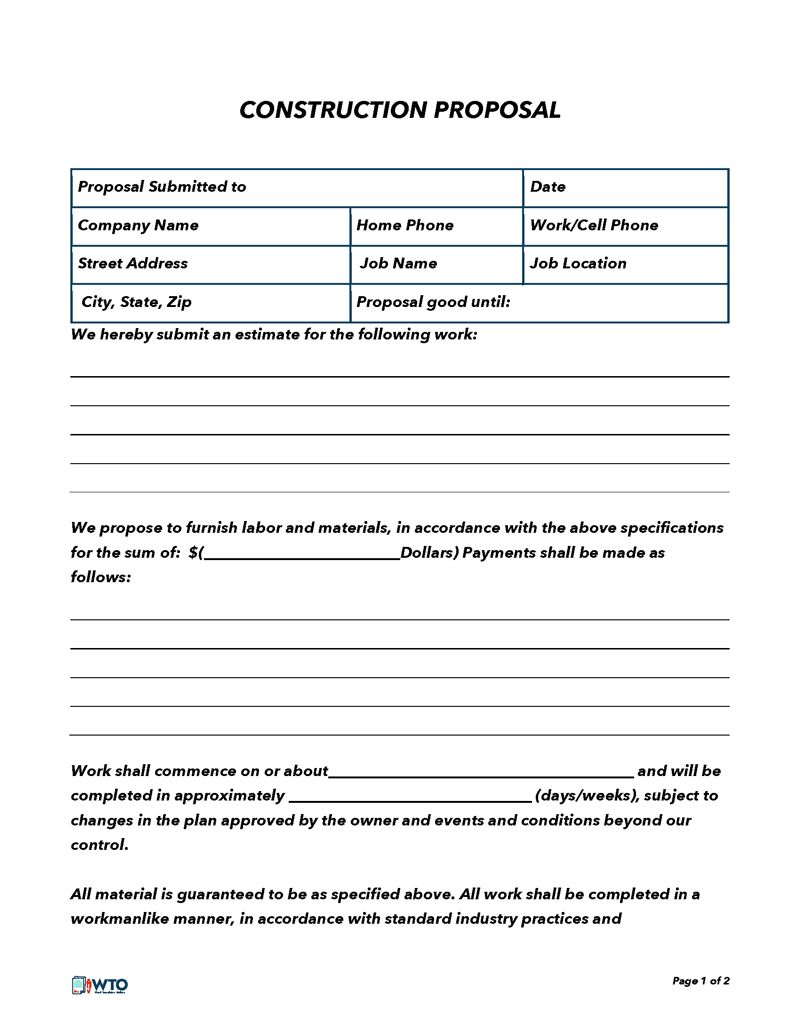
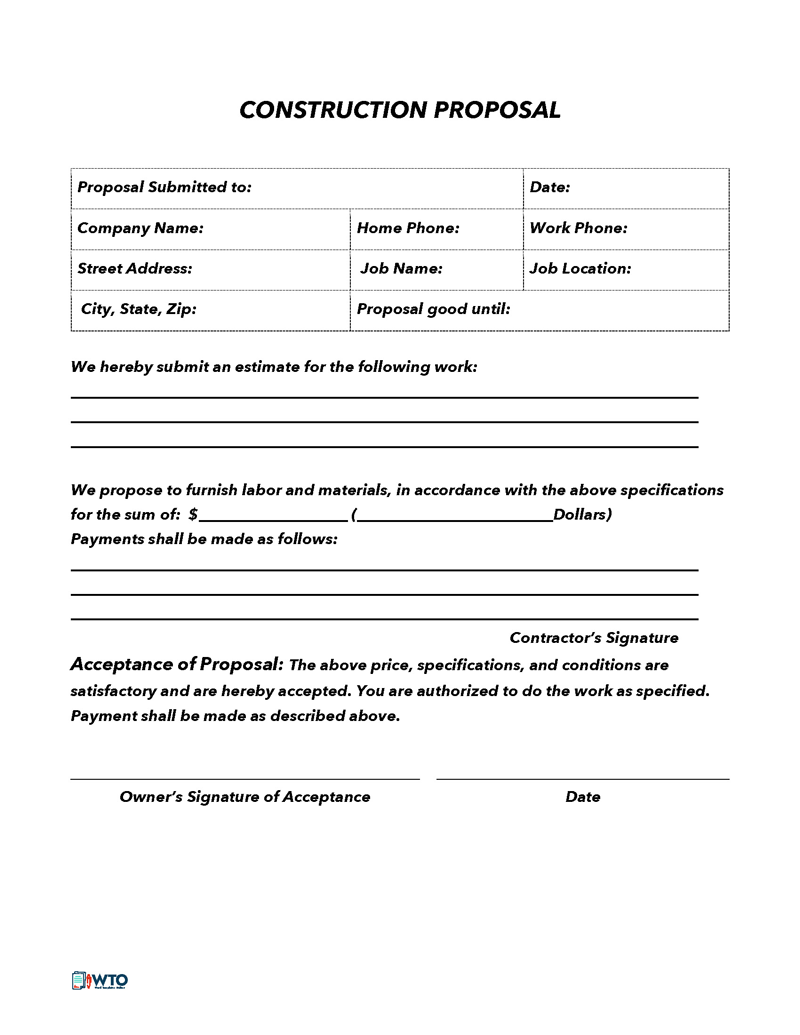
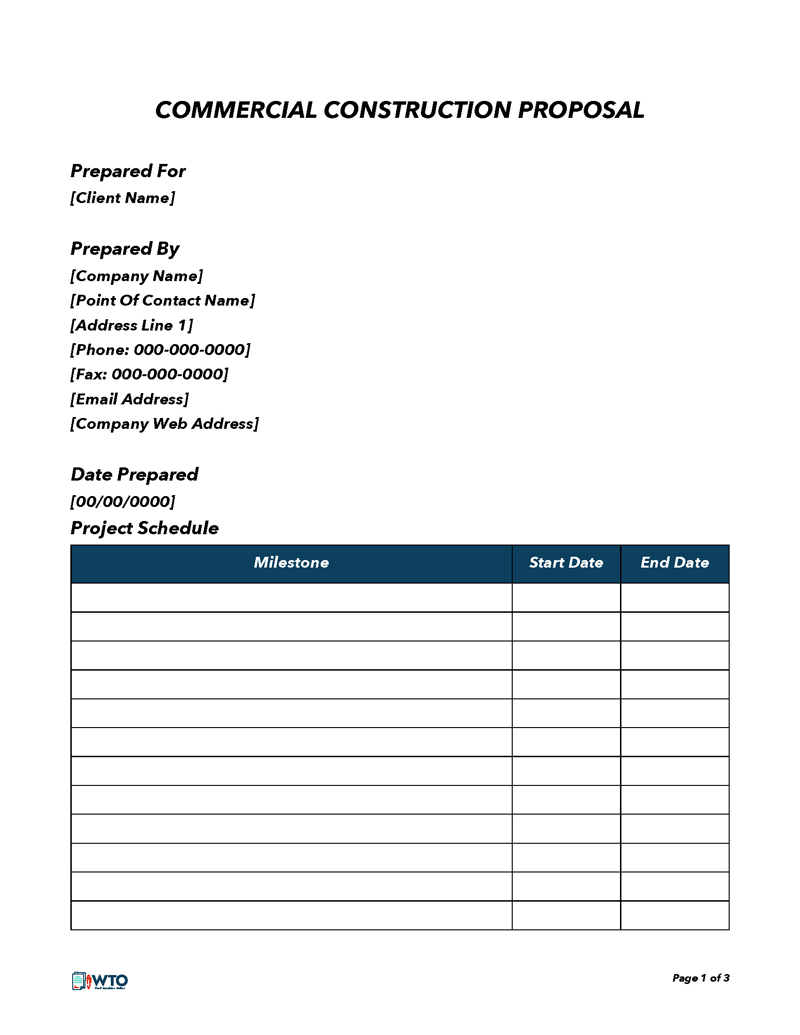
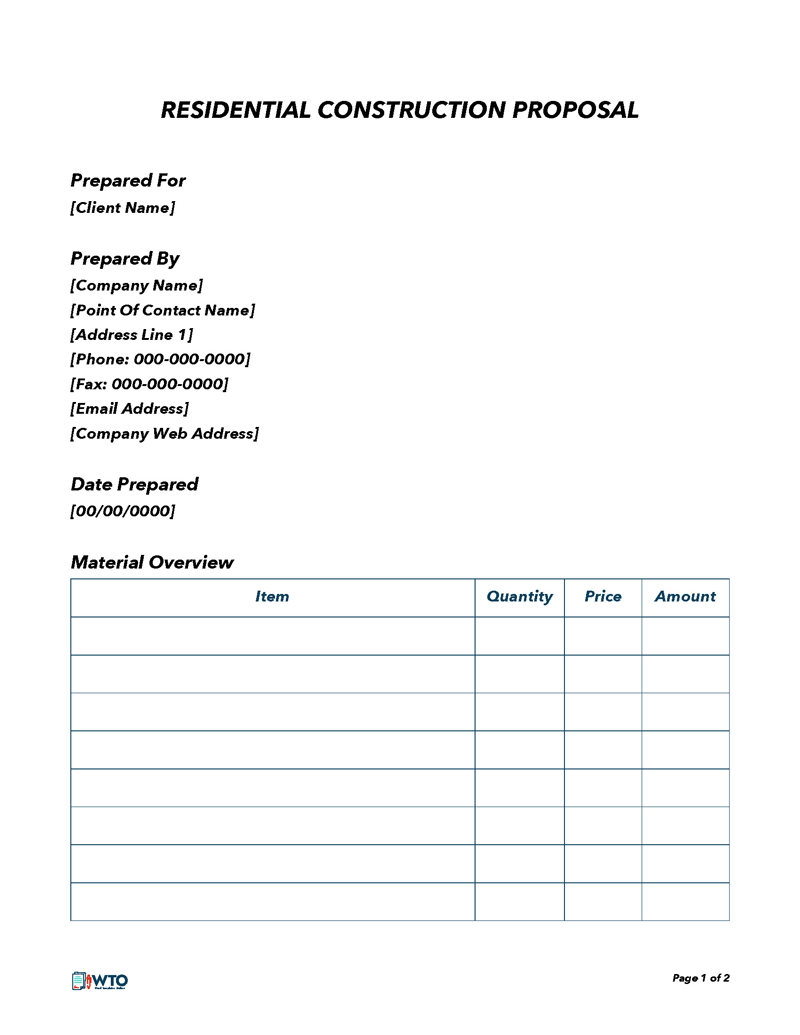
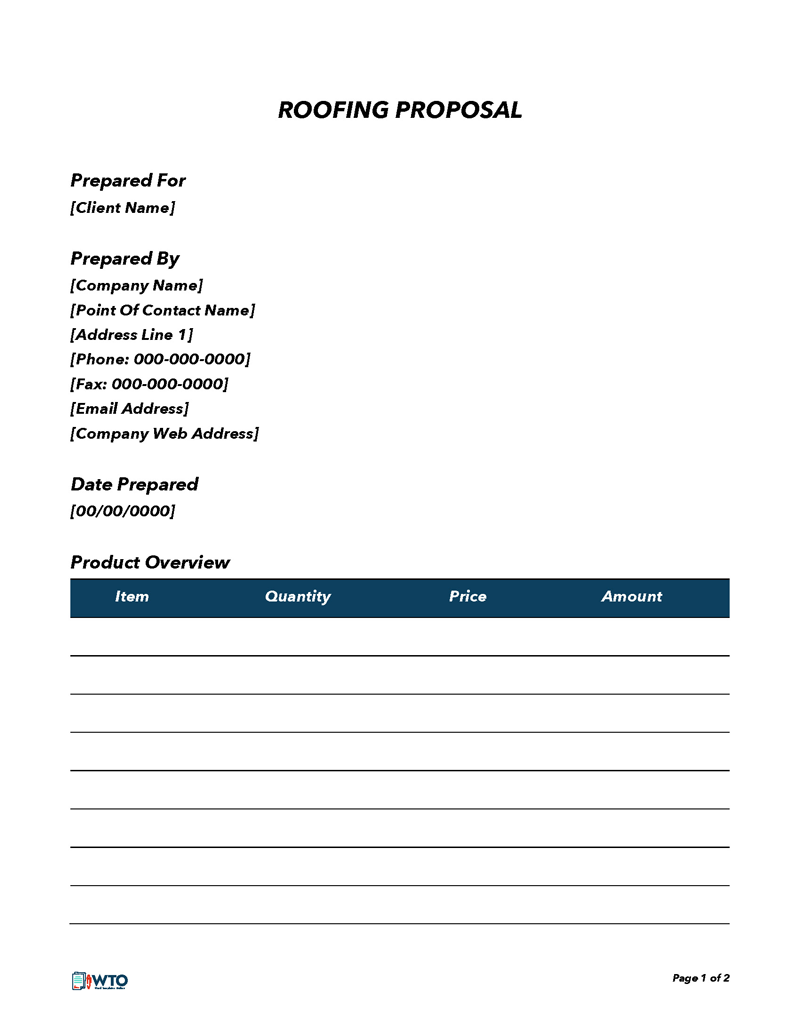
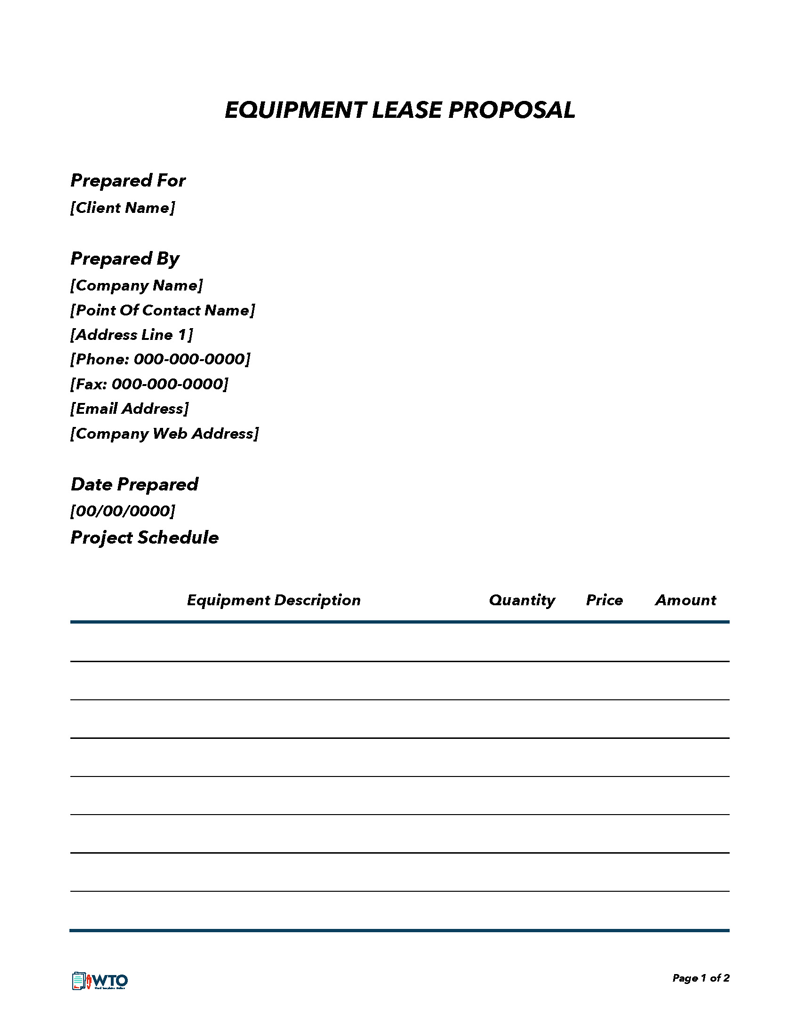
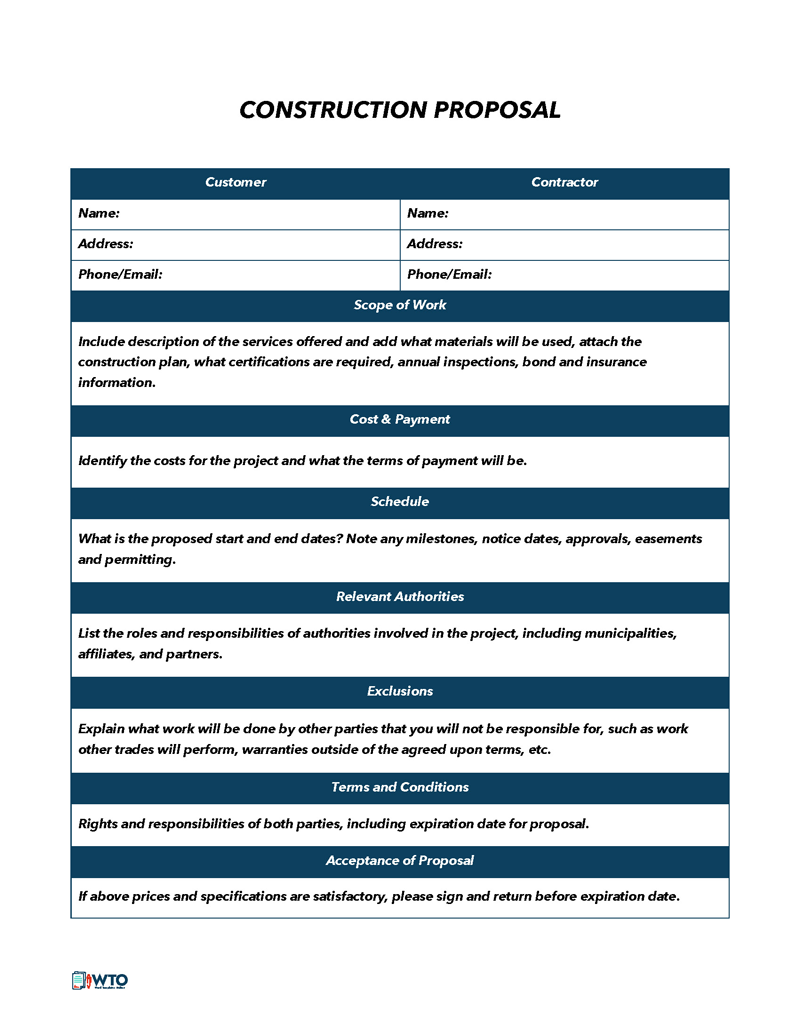
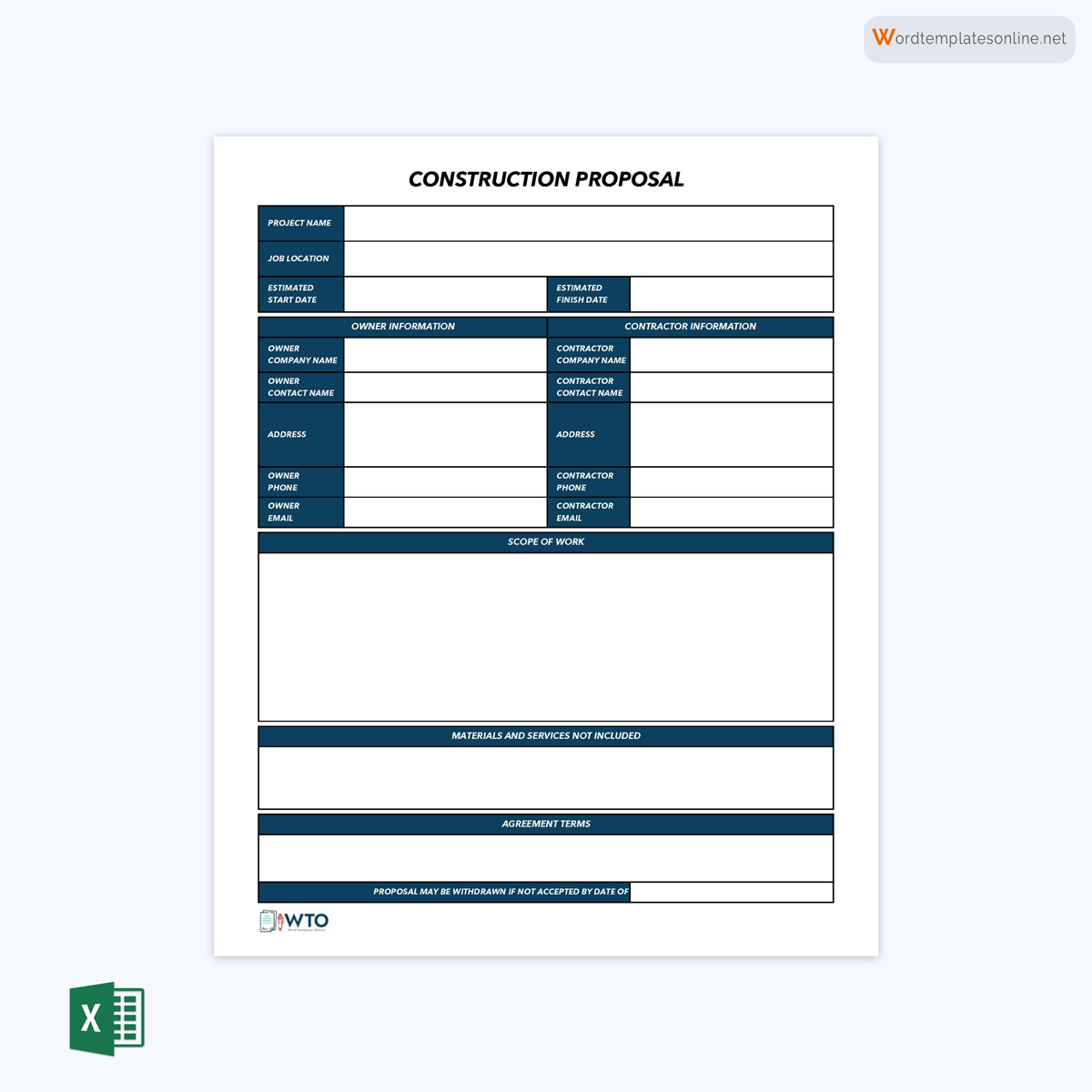
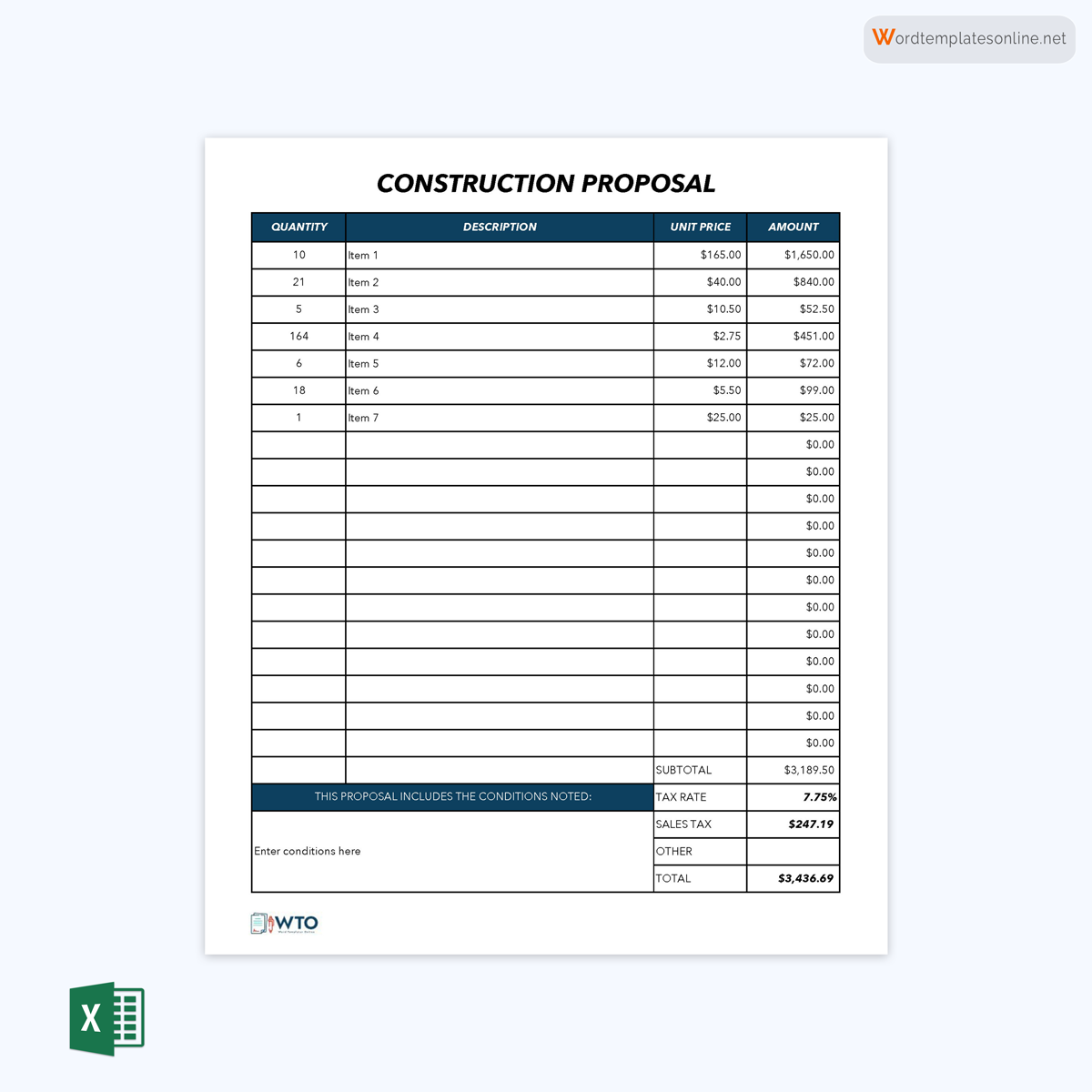
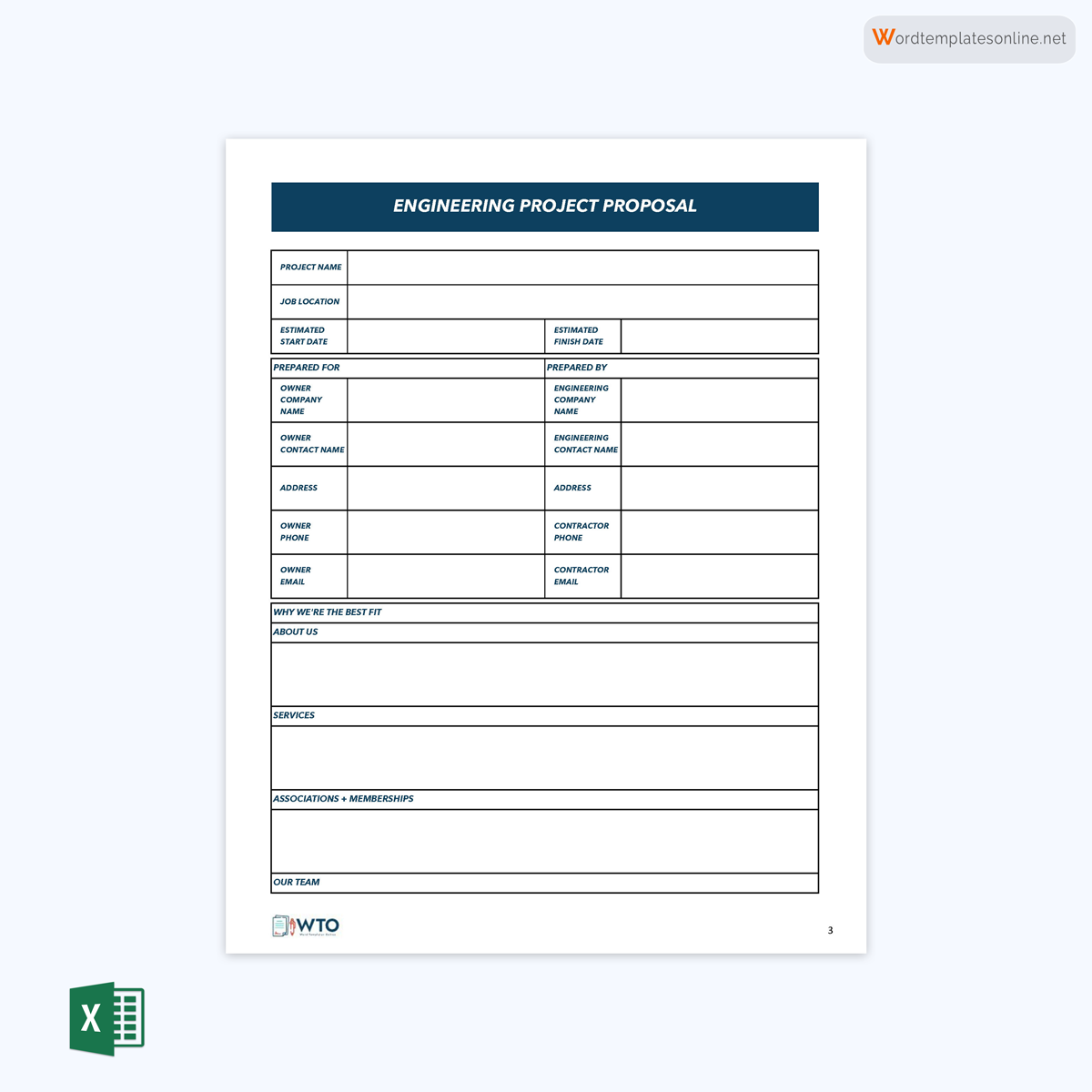
What is Included in a Construction Proposal?
When submitting a construction proposal, it is essential to include all the necessary information to support your bid.
Below are the details you need to include in it:
Scope of work
A detailed scope of work will list all the items the contractor must complete for the project. It is an outline of all the options available within a given project. It includes all services, trade and job materials, audiovisuals, and other materials. You should include these details to give potential clients an estimate of what is needed to complete a particular project.
Estimated cost
As a contractor, you should give the customer an estimate of how much the project will cost. This should include all direct costs, such as labor (including subcontractors), equipment, the acquisition of quantities, including all materials required to complete construction, and allowance amounts. In addition, it would be best to consider all overhead costs, such as office rent and running costs.
Client’s information
It should include the client’s name, address, telephone number, and email (if available) for it to be legally binding. It also states a contractor’s duties and responsibilities.
A payment schedule
The payment schedule is designed to ensure that all payments related to the project are made on time. The contractor and client should use the schedule to track payments and invoices. Organizing this information in one place is crucial for easy reference.
Additionally, while local laws and regulations may stipulate some terms, this section will help prevent customers from refusing to pay.
Start and finish dates
Your proposal must include start and finish dates. These dates are important because the cost you determine often depends on the work scope. If the date changes, it is quite possible that the material and labor costs will also change. You should also include the date when the project was approved.
note
Also, note when the milestone must be reached and who is responsible for the delay.
Hidden defects and unforeseen conditions
Inexperienced contractors often overlook hidden defects and unforeseeable conditions. This can lead to costly delays and added expenses. In addition, the project could incur additional costs associated with testing, handling, cleaning, containment, disposal, or destruction of unforeseen issues.
Adding this section can save time, money, and conflict.
Schedule
A detailed timeline is essential to any proposal because it shows how soon your company can start work on the project. In addition, it should indicate how long it will take to obtain permits and approvals, work orders, and completion. When scheduling your project, consider possible delays due to weather, delivery services, and other factors beyond your control.
Changes and extras
If there are any changes that a client would like to make to a project or any additions that would be required, they should be included in the proposal for clarity and understanding. In addition, here you can detail who is responsible for anything after construction starts.
Exceptions
Exceptions are the duties undertaken by those outside the project’s scope, like subcontractors. Include a list of all subcontractors who will work on the project and what duties they will perform.
Terms and conditions
This section should contain any terms and conditions regarding the project. In addition, it highlights the rights and obligations of both parties,
EXAMPLE
Who pays for the materials, how payments will be made, etc.
Warranty
A warranty should be included as a safety measure. A warranty highlights which work you are obliged to do, under what circumstances, and what you are not responsible for.
EXAMPLE
You can include a warranty stipulating that you are not liable for everyday wear and tear caused by natural conditions such as rainfall.
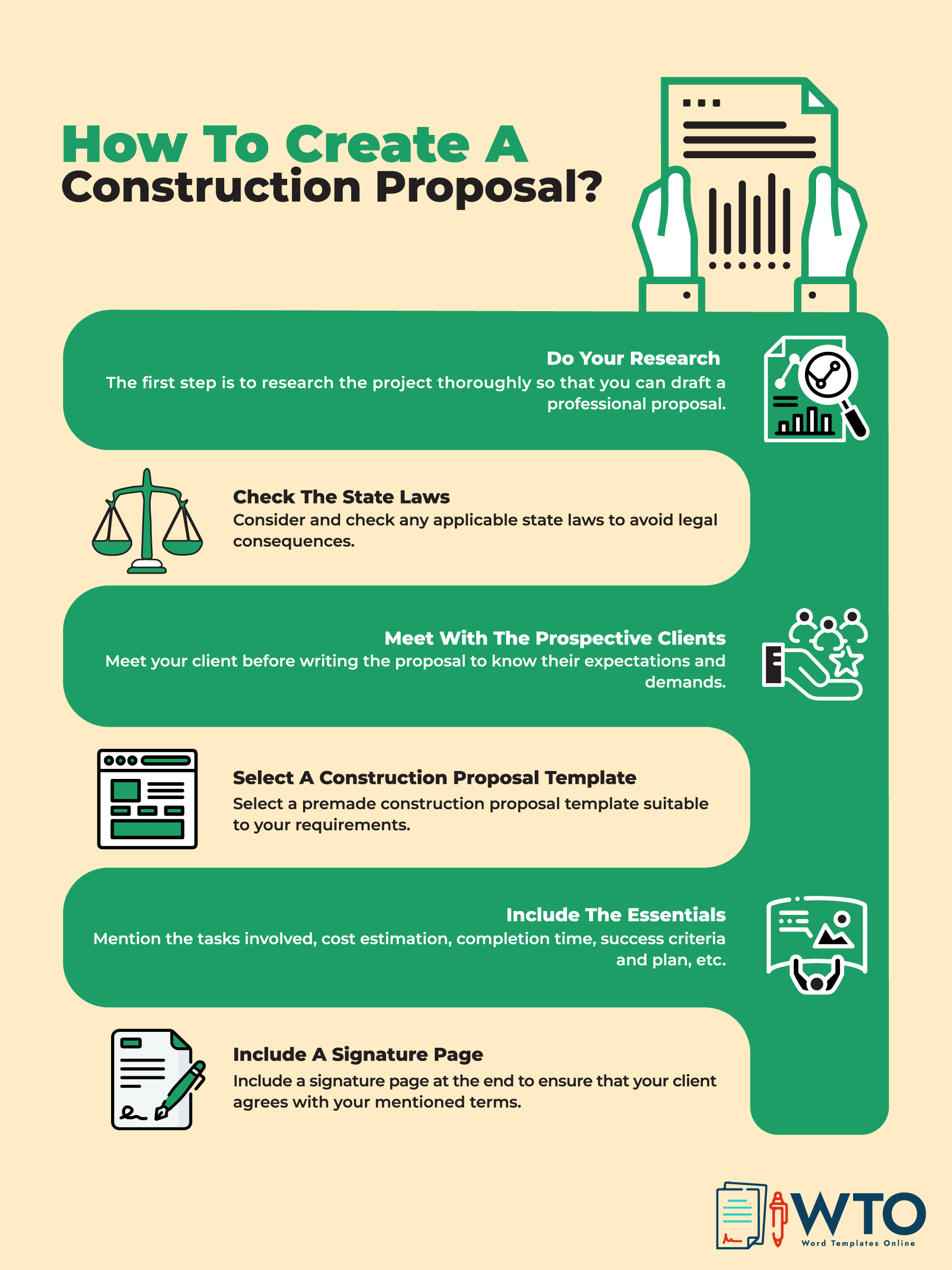
How to Create a Construction Proposal
Writing a proposal can be challenging, but the process can be streamlined and simplified with the correct information.
Follow the steps below to create an offer that will impress your clients:
Do your research
The first step is to research the project. The more you know about your client’s project, the more likely you are to complete it to their satisfaction. In addition, this will ensure you have enough information to complete a thorough proposal, increasing your chances of winning the contract.
Check state laws
You will have to check the state laws before creating your proposal. Each state has different rules for the approval of construction plans. You can ensure that you adhere to all relevant regulations by checking for such requirements. However, different states have different laws on what should be included in a construction proposal.
Meet with the prospective clients
Meeting potential clients is perhaps the most crucial step before writing a proposal. When meeting with prospective clients, it is essential to come prepared by making a list of questions you want to ask. Establish what their needs and expectations are so that you can create a proposal they will be happy with.
A proposal is not just about presenting information; it is also an opportunity to gauge interest and see if there is a potential match. It’s helpful to set up meetings beforehand, so you have time to ask questions and get an idea of what they are looking for.
Select a template
Before you start writing, it is essential to have a detailed template in place. A template can help you organize your thoughts and ensure all the necessary information is included. The primary purpose of a template is to make your job easier and reduce any chance of errors in formatting or content.
In addition, templates are essential if you want format consistency. Using one is much easier than writing from scratch. It also ensures you create an effective proposal for your clients. This website has customizable and downloadable templates that you can use to create a proposal that suits your projects.
Be specific and detailed
Try to include as much information as possible so that the potential clients are confident in your ability to complete the project. Be specific and detailed in your proposal, so potential clients know exactly what they are getting into. A template will help you organize your thoughts and ensure all the necessary information is included.
Include a signature section
The last step is signing. A signature section should be included at the end of the proposal so that both parties can sign to confirm its completion and acceptance.
Tips for Winning Construction Proposal
There are a few things you can do to craft an excellent proposal. Below are tips to help you write an effective one:
Give a personalized touch
You should always give your proposal a professional touch. Tailor them to suit each specific project that you bid for. No matter how generic it may be, making it as unique as possible is crucial. Builders, architects, and property owners appreciate unique proposals that cater to their needs. You can personalize it by adding a watermark of your company’s logo on the contract, using a template, etc.
Focus on the details
It is essential to focus on the details, confirm that they are accurate, and include everything, i.e., descriptions, images, graphics, budget, etc. Also, it is important to provide clear, understandable information that customers can trust.
Ensure your data is accurate
The data is more than just a list of requirements. It must be accurate because it will be used as the basis for agreements and contracts. Therefore, the data concerning all materials and labor estimates should be accurate and current.
Conclusion
Whether you are a first-time or experienced contractor, it is always essential to have a construction proposal template ready. It is a perfect way to introduce yourself and your team to potential clients and should be tailored specifically to the project. A well-crafted proposal will give you the edge you need to win the contract. Furthermore, it is a great way to show your clients what you can offer.
A fully functional design is vital to contracting and bidding. It is a document that will help your clients make an informed decision regarding the project while highlighting your skills and expertise. Always ensure you are researching and going above and beyond to create a proposal that will make clients view you as a reliable contractor. Creating a construction proposal is a complex and time-consuming task. Luckily, with the help of a template, the process can be simplified considerably.




